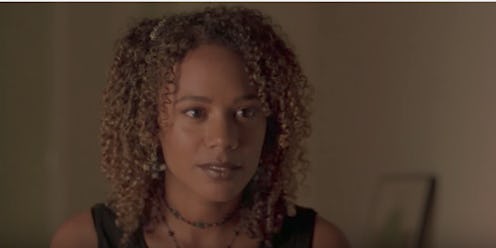Entertainment
Rochelle From 'The Craft' Was The Original Ode To Black Girl Magic

I remember the first time I watched The Craft. This iconic movie from the good ole days of 1996 shared an array of looks in leather, chokers, catholic school girl plaids, and oversized clothing that still send me into a '90s nostalgia frenzy. But the wayward girl squad is what made me love the movie even more.
At 15, I was, of course, dying to be someone else. At that age, I wasn't quite the confident breath of fresh air I declare that I am now. When I was watching The Craft, I was part of their messy journey. I was cool. I was magical. And obviously if I was pretending I was part of their wild friend group, I was the sarcastic, curly-haired Rochelle played by Rachel True.
She was the only black girl on screen and that was "black girl magic" in a literal sense, before the popular hashtag made it a phrase in everyone's lexicon. Rochelle meant a lot to a girl struggling in the mirror to flatten her curls each morning before school and was obsessed with sci-fi fiction and shows like Charmed. I was nerdy — searching for validation the way teenagers do, but in an angsty "humanity sucks"/Bella Swan kind of way. And in a lot of ways, I felt just like Rochelle.
She was the mostly invisible outcast, and in my opinion, was often positioned as a sounding board for everyone else's journey. I can say I've experienced many points in my life feeling just like her in spaces with few people of color. I was often surrounded by people I felt like had me play a certain role in their lives, the token black girl. However, I found smaller circles of acceptance, or my coven, where I could be visible and even powerful. Even though I wouldn't band together and try to effectively murder one of the other members (whoops, spoiler!), I understood what it felt like to be picked at because you're different.
It was also really important for me to see how Rochelle at points used and acknowledged her power. When she wasn't facing off with racist bullies, she became this confident woman who felt like people could see her for the first time. And watching her use that power to claim justice for herself was empowering, and all the way badass! Even if I disagreed with the way that she used that power in the end, for the first time, I saw a black girl using her magic to get ahead — or in Rochelle's case, just survive high school. This wasn't black girl magic the way we often post and/or speak about it, but it was relatable. For a young black girl having grown up with shows like Sabrina The Teenage Witch, it felt good to see someone who looked like me that could be magical, too.
Twenty years after the release of the film, Rachel True was interviewed by Uproxx about the anniversary of the movie and said a few things that resonate not just in the context of her character in the '90s, but representation in present day films. She noted just how unique the film was for its time, and how unique it was for her to get to play that character — in fact, there still aren't too many black women playing magical witches or heroines. When asked if it helped boost her career, she said, "No, because I'm black," touching on how entertainment and film was creating and still creates hurdles for black actresses where their white counterparts do not.
And even True's character touches on how that power is constructed as a minority; that our power is often conceived as a byproduct of other people's privilege. Looking back, Rochelle was everything good and bad about my teenage years — minus the murder. By the end of the movie, she was illustrated as helplessly flawed and a victim of that power. But for once, I saw black girl magic in a way that said black woman were also human. And even for a moment, I saw how embracing your position as an outcast, black girl could make you magical. So cheers to 20 plus years of iconic Catholic school girl looks and to Rachel True, for giving me a brief intro to black girl magic.